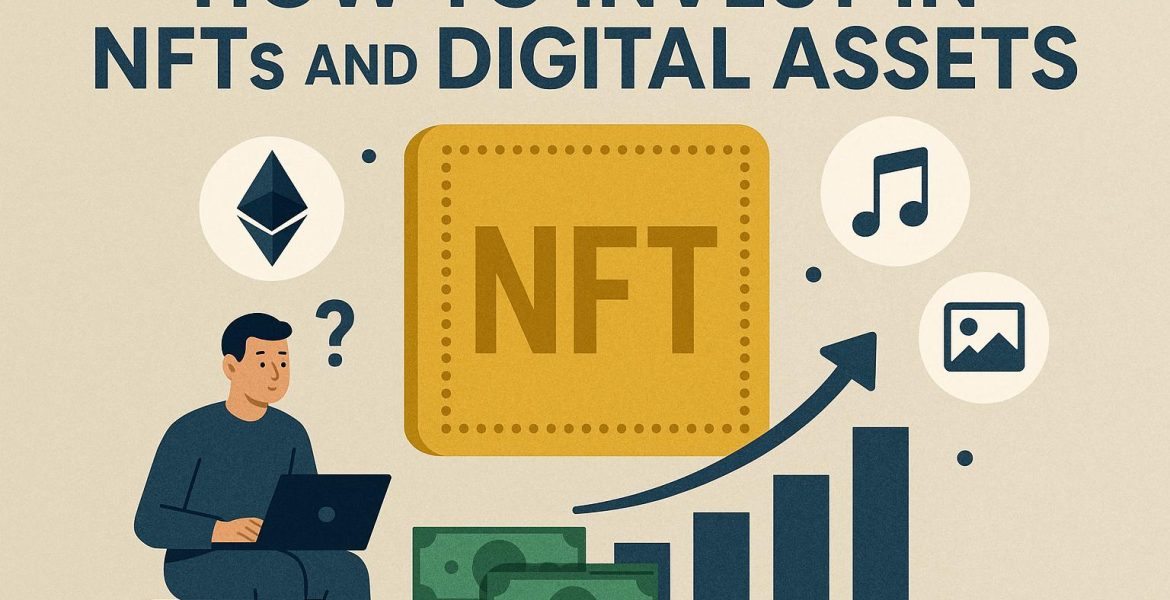
How to Invest in NFTs (Non-Fungible Tokens) and Digital Assets
admin - October 17, 2025Understanding NFTs and Digital Assets
Non-Fungible Tokens (NFTs) have gained significant attention in the digital space as unique digital assets that are verifiable using blockchain technology. Unlike cryptocurrencies like Bitcoin or Ethereum, NFTs cannot be exchanged on a one-to-one basis because each NFT carries unique information distinguishing it from others. This uniqueness is intrinsic to their design and function, adding to their appeal and perceived value in various digital markets.
NFTs can represent ownership of various digital items such as artworks, music, videos, and even virtual real estate. The concept of scarcity and uniqueness gives NFTs their value, making them appealing to collectors and investors alike. As such, they have created new opportunities and markets in the digital landscape which were previously unexplored.
What Are NFTs?
NFTs are digital tokens that use blockchain technology to provide proof of ownership and authenticity for a digital asset. Each NFT contains distinct metadata and a digital signature that render it unique from other NFTs. This intrinsic property is enhanced by the ability of NFTs to be programmed, thus allowing for innovative uses such as automatically paying royalties to the creators when subsequent sales occur. The blockchain ledger ensures that all transactions involving an NFT are transparent, immutable, and publicly verifiable, which adds a layer of security and trust to these digital transactions.
NFTs function based on smart contracts, self-executing contracts with the terms of the agreement directly written into lines of code. These smart contracts are an integral part of how NFTs operate, providing a reliable and automated way to handle transactions. The use of smart contracts not only automates the process but also helps in ensuring accuracy and reducing disputes as the terms are predetermined and immutable once set.
Why Invest in NFTs?
The growing popularity of NFTs comes from their potential as investment vehicles. Like traditional art, rare collections, or real estate, NFTs offer opportunities for price appreciation over time. However, their value is primarily derived from demand, ownership history, and the intrinsic appeal of the underlying digital asset. Given the speculative nature of NFTs, potential investors must conduct thorough research to gauge market trends and demand.
Moreover, NFTs offer a new level of monetization for creators. Artists and musicians can connect directly with their audience without intermediaries, retaining more of the revenue from their work. This democratization of the creative industry through NFTs is another driving force behind their attractiveness as an investment.
Despite their potential rewards, investing in NFTs carries risks. The market is still in its nascent stages and thus can be unpredictable. The lack of regulation means investors need to be more diligent in understanding what they are investing in and the associated risks.
How to Purchase NFTs
To invest in NFTs, individuals must first understand the essentials of acquiring them through digital marketplaces.
Create a Digital Wallet
Before acquiring NFTs, one must set up a digital wallet that supports NFTs and the currency used to purchase them. Popular wallets include MetaMask, Trust Wallet, and Coinbase Wallet. These wallets store the digital tokens and provide a secure means of transferring assets. A digital wallet essentially acts as a digital bank account, providing the necessary infrastructure to interact with NFT marketplaces.
Setting up a digital wallet is a straightforward process, often involving downloading an application or browser extension, creating a secure password, and safely backing up a recovery phrase that can restore the wallet if access is lost. The importance of securing the wallet and backing up the recovery phrases cannot be overstressed, as losing access to the wallet or recovery phrase could mean losing access to valuable digital assets.
Fund Your Wallet
After setting up a digital wallet, investors need to purchase cryptocurrencies, with Ethereum (ETH) as the most commonly used. These cryptocurrencies can be acquired on several crypto exchange platforms, including Coinbase and Binance. Once acquired, these cryptocurrencies need to be transferred to the digital wallet to fund the purchase of NFTs.
Understanding the conversion rates and transaction fees between fiat currency and cryptocurrencies is vital to make informed decisions and minimize losses during transactions.
Select an NFT Marketplace
Numerous NFT marketplaces allow buyers and sellers to trade digital assets. Prominent platforms include OpenSea, Rarible, and Foundation. Each of these platforms might cater to different types of NFTs, including art, music, collectibles, and virtual reality items.
Therefore, it is crucial for investors to choose one that aligns with their interests and investment goals. Evaluating various fees, such as transaction fees or commissions the platform might charge, is also an important consideration in selecting a marketplace.
Considerations for NFT Investment
Investing in NFTs entails certain risks and rewards, requiring investors to consider several factors critically.
Research and Valuation
Determining the value of an NFT can be challenging due to market volatility and the subjective nature of digital art and collectibles. Investors must delve deeply into the background of the NFT’s creator, its rarity, ownership history, and potential demand. Valuation is more of an art than a science at this stage, as the factors influencing an NFT’s worth can be subjective and vary across different sectors of the digital market.
An awareness of which types of NFTs are gaining traction and understanding the specific appeal they present should guide investment decisions. Research into communities or fan bases that support various NFT projects can provide indicators of potential future value and demand.
Market Volatility
The NFT market is characterized by rapid changes and high volatility. Prices can swing dramatically due to public interest, trends, or changes in the broader cryptocurrency market. Investors must be prepared for these fluctuations and the potential for loss. Understanding and accepting the inherent risks associated with this evolving market is crucial before significant investment.
Legal and Ethical Concerns
NFT investments may involve legal complexities, particularly concerning intellectual property rights and unauthorized reproduction of works. It’s advisable for investors to be aware of and compliant with legal stipulations to avoid potential issues. Furthermore, ethical considerations, such as the environmental impact of mining cryptocurrencies used in NFT transactions, have been highlighted and debated within various circles, adding another dimension for potential investors to consider.
Conclusion
NFTs represent a burgeoning class of digital assets that offer both challenges and opportunities for investors. Understanding the dynamics of the NFT market, setting up the right tools, and conducting diligent research are essential steps for individuals interested in exploring NFTs as an investment option. As the digital asset landscape continues to evolve, staying informed and cautious can help investors navigate this novel financial frontier. The rapid expansion of the NFT market speaks to the potential growth opportunities, but with that also comes the necessity for rapid learning and adapting to the ever-changing digital environment.
This article was last updated on: October 17, 2025
